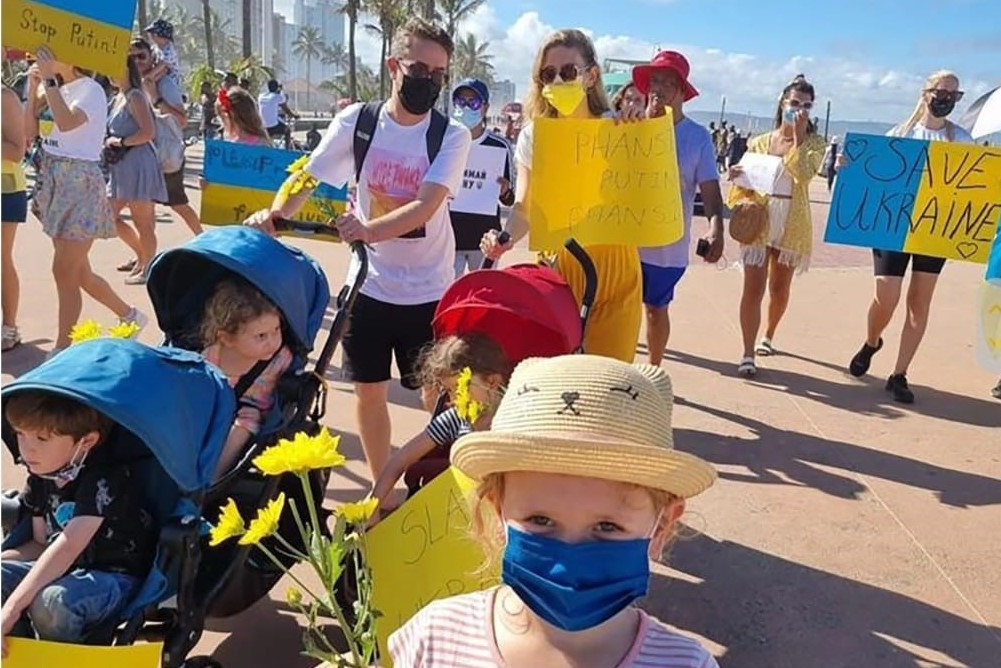click to dowload our latest edition
CLICK HERE TO SUBSCRIBE TO OUR NEWSLETTER


Published
2 years agoon
Instead of taking her four kids to the park or the beach on Sunday, 6 March 2022, Alana Baranov and her husband, Gary, took them to the Durban promenade to join a peaceful march in protest against Russia’s invasion of Ukraine.
“I was asked by journalists why I decided to bring young children and I said it was because I’m a proud South African and a proudly Jewish South African. Because of our South African past and my community’s history, it’s important not to be bystanders when atrocities happen. When there’s injustice somewhere in the world, it’s incumbent upon us to speak out and to make sure we learn from the lessons of the past,” she says.
“What we’re seeing in Ukraine is a war crime and indiscriminate attacks against innocent civilians, women, children and the elderly. This is something that goes against our principles as Jews and as South Africans, as enshrined in our Constitution and our Bill of Rights.
“It was important for me to show my children that we each have the responsibility to speak out and that we can use our voice. What we do matters. We need to ensure we’re on the right side of history. They really took to it. It was a meaningful day. The main message of the march was for South Africa to take a stand and condemn the violence.”
For Baranov, it was even more personal, as her sister-in-law, Vita Valinka Pugh-Jones, is Ukrainian. “She is from a village in the mountain area of Ukraine towards the centre of the country,” says Baranov. “Her mother, brother, extended family and friends are there. It’s been an incredibly stressful time for her and she’s very worried about them. Her mother and brother are safe for the moment, but they are surrounded by conflict and bombing. The train station closest to them, the airport two hours away and all of the means of transport and infrastructure have already been bombed.
“They are running low on provisions and are worried about losing electricity and data connection. Her friends in Kyiv have fled for their lives and she hears from them only every few days. They are trying to get out of the country to safety. Vita lives in Durban and has been in South Africa for about 12 years. She is pregnant, due in May. It’s her first child and they planned for her mom to come out for the birth, but now they don’t know when they will see her next.”
Pugh-Jones was one of the main organisers of the march, which was arranged by the Ukrainian Association of South Africa, a non-profit organisation that unites South Africans and Ukrainians and aims to build dialogue between the two countries.
In its press release announcing the march, it said it was a “peaceful protest against the procrastination of the South African government in condemning Russia’s invasion in Ukraine”. Addressing the minister of international relations and co-operation (Dirco), Dr Naledi Pandor, the organisation noted that the late struggle icon, Steve Biko, once said, “There’s no freedom in silence.”
They called on the South African government to condemn immediately and unequivocally Russia’s invasion of Ukraine “and to call on Putin to stop this inhumane, violent, murderous attack on the free people of Ukraine”.
“We’re ashamed that on 2 March, South Africa abstained from the United Nations General Assembly vote to condemn the illegal and illegitimate Russian invasion of Ukraine. We call on the Republic of South Africa to make its voice heard and reaffirm the values of human rights, respect for international law and principles of sovereignty and democracy, which are the cornerstones of South Africa’s Constitution.”
The statement noted that “Russia is turning Ukraine, a sovereign nation with developed political, economic and public institutions and a population of more than 43 million inhabitants, into ruins. In just six days of war so far, Russia’s attack has among its casualties many hospitals, kindergartens, and civilian apartments. The death toll – currently more than 2 000 civilians including more than 100 children – is growing every day. As attacks intensify, this death toll is likely to increase rapidly. More than 1 000 000 Ukrainians and also thousands of non-Ukrainians [including South African citizens] have been turned into refugees overnight. As you read this, civilians are being murdered and their homes and country are being destroyed.”
It said the Russian invasion would have a vast impact not only on Ukraine; it would “hit the most vulnerable people in South Africa by petrol-price hikes, food shortages, financial instability and the reduction of funds for developmental causes”.
“South Africa’s history of the fight for self-determination and democracy to free its people from the oppressive apartheid government calls on the current democratic government to condemn this invasion as an attack on sovereignty, freedom, democracy, the civil population and the institutions of a free country.”
It also called on South Africa to allow visa-free entrance into the country for those Ukrainians whose family members were temporarily or permanently living here. Baranov emphasises this point. “A lot of South African Ukrainians and Ukrainians living in South Africa for many years on valid permits have been desperately trying to contact the department of home affairs and Dirco to ask if there’s any way that they can bring out their immediate family members who literally fear for their lives. They have been stonewalled at every turn. So, the organisers want to put pressure on the government to accept these refugees and be a home for Ukrainians fleeing the violence.”
